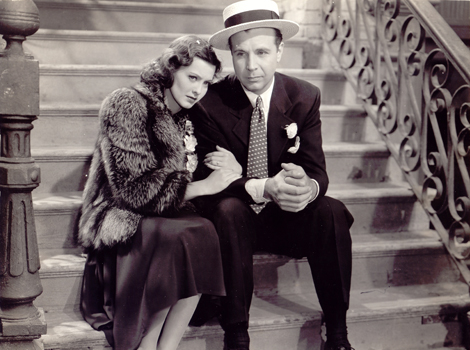Tonight the Seattle Art Museum kicks off its latest series of 35mm film presentations, this one devoted to writer-director Preston Sturges, who with a handful of masterpieces in the early and mid-1940s brought the screwball comedy era to its magnificent conclusion. The museum is presenting six of his films, playing every Thursday night through August 13. We’ll be covering them all here at Seattle Screen Scene, along with recording an episode of the They Shot Pictures podcast devoted to Sturges, which we should have up in two weeks or so.
First up is the least well-known, unfairly I think, Christmas in July, in which Dick Powell plays a wannabe adman who is tricked by some fellow workers into believing his submission in a coffee company’s slogan contest has won the $25,000 grand prize. A series of misunderstandings gets him the big check, a promotion and an engagement, and before the truth can come out he’s showered his whole neighborhood with gifts and toys. Deftly sketching the generational layers of the mid-century immigrant class system, Sturges gives as subtle a portrait of the disasters and fantasies provoked by capitalism as you’ll find in Hollywood, a far cry from the sentimentality and privileged condescension of his future avatar John L. Sullivan. The tone is delicately balanced between screwball and melancholy, the warm loneliness of Powell and his girl (Ellen Drew) dreaming on a rooftop leavened by the ten minutes it takes him to explain his slogan to her (“It’s a pun” is his hopeless refrain). Sturges would never again be this relaxed.

That slogan (“If you can’t sleep at night, it isn’t the coffee. It’s the bunk.”) initially bewilders us as much as it does poor Drew. But through force of repetition, it begins to take on an unsuspected depth, less a slogan than a koan. It takes a perceived drawback of the product in question (coffee keeps you up at night) and not only denies its existence (the claim is “the bunk”) but deflects it onto a harmless, defenseless object (the “bunk” on which you’re trying to sleep). From the first step it’s a small leap to Miriam Yueng’s “reverse thinking” in Don’t Go Breaking My Heart 2, wherein the logic of capitalism dictates that being wrong is just as valuable as being right, as long as you go forward (she has trouble parallel parking). Contrast this with the logic of capitalism embodied by Barbara Stanwyck in 1933’s Baby Face, in which the demand is an inexorable movement upwards, regardless of the moral cost. The deflective action of course is capital’s primary defense mechanism, shifting attention to something, anything other than the true source of the problem. Denial and misdirection are thus hallmarks of our political and economic systems, as true today as it was 75 years ago.

Powell, and everyone else in the film, wholeheartedly believes in the system, even as it crushes them. That Powell’s first acts on receiving his windfall are of generosity and community are pointedly seen as bizarre, though everyone in the department store is of course more than happy to accept his money. At this point it becomes inevitable that the truth must come out and destroy him. The low point is a sad and heartfelt conversation with his sympathetic boss, not an immigrant who worked his way up, but a member of the inheriting class, a man who simply doesn’t know if Powell’s work is any good or not (“I’m no genius. I didn’t hang on to my father’s money by backing my own judgment, you know.”) But Sturges, as he will do repeatedly in the years to come, will only carry us to the brink of tragedy. In a twist that rivals the perfect constructions of the endings of Sullivan’s Travels and The Miracle of Morgan’s Creek (and pointedly not the sheer insanity of The Palm Beach Story), we get the happy ending we needed all along, the one we’re told we deserve. And we believe it. It’s the bunk.
Christmas in July plays on 35mm film on Thursday, July 9th at the Seattle Art Museum.


One thought on “Christmas in July (Preston Sturges, 1940)”
Comments are closed.